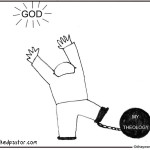We run our website the way we wished the whole internet worked: we provide high quality original content with no ads. We are funded solely by your direct support. Please consider supporting this project.

Tragedy Strikes and Coherence Goes Out the Window
I encourage you to read Aurora shooting inspires various perspectives on God and belief, written by Electa Draper and published on the front page of the Denver Post Monday. The article shows how differently believers process tragedies, and illustrates the centrally important role one’s picture of God plays in these responses.
For today, I’d like us to simply notice the lack of logical consistency of many of those who believe in a personal God, as illustrated in this article. (I’ll talk about the seven different responses to this tragedy toward the end of the article in a subsequent blog.)
I’ll start by applauding the logical consistency of Sikhism that was captured in Draper’s article. As with Islam (out of which Sikhism sprang around 1700), Sikhism holds that God is all-good and also that he determines all things. From this it draws the perfectly logical conclusion that all that happens is good. In the words of one Sikh scholar, “[t]he Sikh does not perceive anything in the world as bad. Yes, there is tragedy and suffering – we feel it – [but] we don’t perceive it to be from evil.”
This logical consistency is commendable. At the same time, however, we have to seriously question how anyone can look at the tragedies in the Colorado theater or the Wisconsin Sikh temple – or even worse, in Auschwitz or in horror stories of kidnapped children who are raped and tortured for years – and not call it evil? Indeed, if there is no “evil,” doesn’t the word “good” lose meaning? Moreover, if there is no evil, one wonders why the Sikh leader in the Wisconsin temple picked up a knife and tried to stop the shooter in his temple? Why try to stop something that is good? Sikhism may be logically consistent, therefore, but it doesn’t seem consistent at an existential or ethical level.
But many, if not most, Evangelical Christians can’t even claim logical consistency, as is apparent from this article. While there are many variations regarding the details, most conservative Christians simultaneously hold to four beliefs: a) God is all-loving and all-powerful; b) evil is real; c) God “allows” or “causes” all evil “for a good purpose;” yet, d) God is not responsible for evil. How evil events can be caused or allowed for a specific good divine purpose without God being responsible for these events is far from clear, to say the least.
Of course, as the article makes clear, many Christians place the blame for evil on human free will or on Satan, a point with which I agree. But assigning blame to these agents only allows us to not blame to God if we are also willing to say that the purpose for the evil arose out of these agents and not God. If we say this, however, we must deny that the evil happened for a good divine purpose. We could say (and I in fact do say) that God brings a good purpose to evil events. But that is very different from saying evil events happen for the purpose God brings to them.
One of several illustrations of this incoherence in Draper’s article is a young man who came to the theater in Aurora on that fateful night shortly after giving a talk at a church entitled, “God’s Plans Don’t Always Make Sense.” This young man holds that “God has a purpose for all of us” while also insisting that God wasn’t “playing favorites at the movie theater by saving some and not others.” I may be reading too much into this young man’s words, but I suspect he was trying to simultaneously get God off the hook for the arbitrary way people were shot in the Colorado theater while affirming that everything fulfills God’s purpose for people’s lives, too.
I understand why people simultaneously long for the comfort of believing that everything happens for a good, divine purpose while also longing for the comfort of believing that God is perfectly good. That’s why when tragedy strikes, coherence among Christians tends to go out the window.
What is sad, in my opinion, is that this incoherence is as unnecessary as these mutual longings are understandable. We don’t need to believe that all things happen for a good purpose in order to believe that all things happen with a divine purpose. I submit that the ultimate reason why any evil event happens resides in the will of agents other than God. Yet, whatever free agents decide to do, we can affirm that the infinitely wise God has an eternally prepared plan in place as to how he will respond and bring good out of evil, in case it occurs. And if we remain confident in God’s unlimited intelligence, we can affirm that his plan to respond to bring a good purpose out of evil, in case it occurs, is as good as it would have been if he had allowed the evil event for the purpose he can bring out of it.
Think about it.
Image by Donald Lee Pardue. Used in accordance with Creative Commons. Sourced via Flickr.
Category: General
Tags: Free Will, Problem of Evil, Responding to Calvinism, Theology
Related Reading

Is Free Will compatible with Predestination?
Question: Isn’t “freedom” simply our ability to do what we want? And if this is so there seems to be no incompatibility between saying that a person is “free” on the one hand, but predestined (or at least foreknown) by God, on the other. But why do you say that freedom is not compatible with…

Henry’s Mom: Did God Author This?
Many of you were touched last month when we featured some reflections on little Henry’s death. Well, Henry’s mother Jess has started a blog to process through some of her thoughts and we wanted to share this amazing piece with all of you. Jess thinks ahead to the time when her two-year-old daughter will start…

Why Compatibilistic Freedom Does Not Make Sense
Compatibilism is the view that free will is compatible with determinism. In this view, freedom is defined as the ability to do what you want, though what you want is determined by factors outside of you. Theologians who espouse this perspective, hold that God ultimately determines what individuals want. This is in contrast to “self-determining…

How do you respond to Psalm 135:6?
“Whatever the Lord pleases he does, In heaven and on earth…” (cf. Job 23:13–14; Ps. 115:3; Dan. 4:35) Some conclude from passages such as this that God’s will can never be thwarted. Since Scripture explicitly teaches that God’s will is in fact sometimes thwarted (Isa. 63:10; Luke 7:30; Acts 7:51; Eph. 4:30; Heb. 3:8, 15;…

How do you respond to Acts 2:23 and 4:28?
Question: Acts 2:23 and 4:28 tell us that wicked people crucified Jesus just as God predestined them to do. If this wicked act could be predestined, why couldn’t every other wicked act be predestined? Doesn’t this refute your theory that human acts can’t be free if they are either predestined or foreknown? Answer: In Acts…

